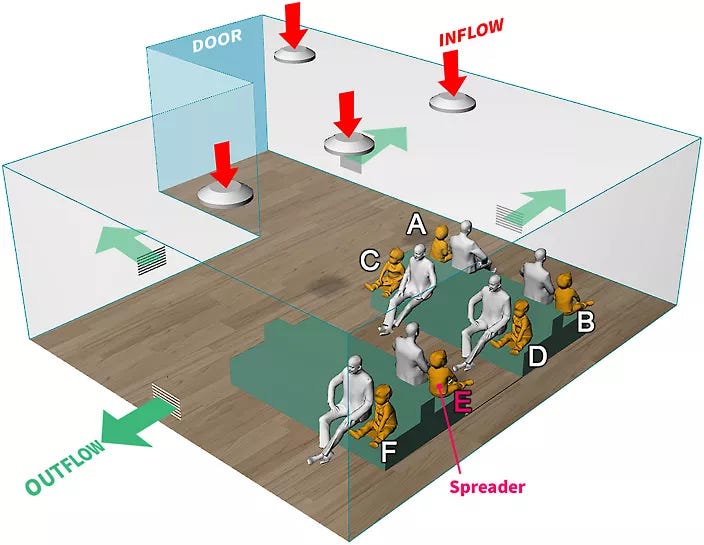COVID, Cholera, and Climatism
Why "speaking truth to power" won't help us prepare for the next pandemic
In 1854, the London suburb of Soho suffered a cholera outbreak, one of many. The disease had been killing thousands in England since the 1830s. We now know that Londoner’s habit of disposing of their waste in open cesspools or into the Thames River allowed Vibrio Cholera, the bacteria that causes cholera, to spread. However, back then people thought that the illness was caused by foul stinks or “miasma.” Social reformer Edwin Chadwick reflected the prevalent belief of the time when he told parliament in 1846, “All smell is disease.”
John Snow was a local obstetrician. Had he stayed in his lane, he might only be a historical footnote, remarkable for pioneering the use of anesthetics for women in labor. However, Snow was also fascinated by cholera.
The doctor sprang into action during the 1854 outbreak, drawing up a map of cholera deaths in the hope of discovering its source. His working theory was that cholera was caused by a water-borne infectious agent, not smells. And his data suggested that the recent surge in cases were centered around the Broad Street water pump. He convinced officials to remove the pump’s handle, but by that time the epidemic was already almost over.
Unfortunately, Snow’s claims that infectious agents rather than miasma was behind cholera’s spread remained disputed for decades. His pleas went unheeded. The Board of Health rejected his “suggestions” to clean up the cesspools and repair primitive sewers, adding ““we see no reason to adopt this belief [of contagion].”
Normally when this story is told, it is meant to be a cautionary tale about the dangers of pseudoscience. We’re supposed to understand it as a story of the (eventual) triumph of empirical science. Some have taken John Snow’s speaking truth to power as model for COVID policy. One group advocating for improving indoor air quality to combat respiratory illnesses actually calls themselves “The John Snow Project.” They have even released a video that depicts the respiratory particles that people breath out to be nasty green clouds of pestilence.
Ironically, The John Snow Project’s video somewhat deviates from Snow’s thesis that a specific contagious agent causes disease. They end up portraying all human breath as akin to miasmic vapors, as a disease vector until proven otherwise. In any case, their underlying theory of political change is clear: If we follow the science then we get policy to improve public health. Not only does this group get the history wrong, they repeat the same political mistake that lies behind much of today’s partisan gridlock.
COVIDism
While the specter of cataclysm has probably always been present in political rhetoric, it seems like everything today gets framed as an existential risk. Anti-LGBT laws aren’t just framed as unjust but as threatening these groups’ “right to exist.” Advocates of continued pandemic precautions warn that COVID isn’t just killing the most vulnerable, but is actually leading to a catastrophic “mass disabling event.”
My hunch is that more and more groups are taking political inspiration from the climate movement. Organizations like Fridays for Future or Extinction Rebellion contend that climate change isn’t merely a big problem. Human survival literally hangs in the balance.
Although there’s always a chance they could be right, the trouble with existential politics is that, well, it isn’t very good politics. To science policy scholar Mike Hulme, this all-or-nothing approach to climate change is climatism. By reducing all human wellbeing to just the climate, environmental politics becomes narrowly ideological. All other human concerns become secondary to reducing carbon emissions. And this can lead to perverse outcomes, such as more poor people dying from respiratory illnesses because the UN is no longer interested in helping them move from burning dung or coal to natural gas stoves.
Trying to make all public health efforts about COVID will, just like climatism, narrow our political horizons and trap us in a never ending culture war over the authoritativeness of Coronavirus research.
The biggest problem is that climatism is polarizing. Yet that’s often activists’ explicit aim. The point of fanatical rhetoric is to try to force fence-sitters to quit waffling and pick a side. But that approach hasn’t seemed to have worked in the climate movement’s favor. The world had been decarbonizing at a steadily increasing rate since 1992. Progress stalled after 2015, despite ever more heated climate rhetoric.
Polarization is a problem not just because it makes for unpleasant political discourse. It tends to amplify scientific uncertainty. We normally think that issues are controversial, because the science is unclear. However, the opposite is usually the case. The higher the political stakes, the less certain the science becomes. That is because people who stand to lose, whether it is from banning fossil fuels or cigarettes, deciding the outcome of the 2000 presidential election, or resolving the Gaza-Israel conflict, have a vested interest in finding errors, biases, and mistakes in the research data (rightly or wrongly).
When stakes of a political dispute is ostensibly human survival, the uncertainty problem only gets worse. Whether the claim is human extinction or the mass cognitive disabling of the world’s population, extreme scenarios imply extreme policies and set the stage for extreme pushback. Trying to make all public health efforts about COVID will, just like climatism, narrow our political horizons and trap us in a never ending culture war over the authoritativeness of Coronavirus research. Embracing COVIDism would likely ensure that reasonable public health goals stay stubbornly out of reach.
How Power Can Reveal the Truth
John Snow died without seeing his theory about contagion reach widespread acceptance. It actually wouldn’t be accepted until after the cholera epidemic of 1866. Interestingly enough, by this time the city of London had already completed a new brand new sewer system. Snow’s research didn’t justify new public health infrastructure, but the other way around. Studies of the 1866 outbreak found that cases were concentrated in areas not yet connected to the new sewer system. Snow’s views were finally vindicated.
If Snow’s contagion theory didn’t provoke the English government into action, what did? We can credit the old miasmic theory for that outcome. The stench of the Thames became so overwhelming that parliament had to close. While national politicians probably had their own water wells, they could no longer hide from the smells that, according to the prevailing miasmic theory, caused disease. A surgeon testified that “it would dangerous…to remain [in parliament]. It would produce malaria and perhaps typhus fever.” Ironically, it was only by following bad science that politicians felt sufficiently personally affected by cholera to get their acts together.
Similar to the banning of ozone-depleting chemicals, London’s major advance in public sanitation wasn’t driven by the science so much as by the interests of people with power. And it wasn’t justified empirically so much as by the almost indisputable performance of a new technology. While Snow’s theory of contagion could be discounted, the practical advantages of the new sewers could not.
To me, this all suggests that The John Snow Project and similar efforts are profoundly misguided. Improved indoor air quality won’t be driven by COVID science, but by using any and every strategy available to us to get new indoor air infrastructure built, period. As much as we hope that Truth can guide politics, we’re better off simply pursuing democratic negotiations.
Making the COVID Era an Historical Moment
The science of cholera was advanced by infrastructural progress, by politics. Similarly, we’ll likely only fully understand COVID and the value of improved indoor air quality by doing things like requiring better ventilation and filtration. Technology sometimes offers the best hope for bringing the debates closer to resolution. However, this demands that we do something counterintuitive. We must deemphasize Coronavirus’ supposed existential risk and not put the disease at the center of indoor air quality advocacy. We need to reject COVIDism.
The Biden Administration is no doubt making some progress in this area. The EPA is working to develop indoor air quality standards, and it has been possible for local governments and schools get federal support via the American Rescue Plan, Bipartisan Infrastructure Law and other programs. But the still developing standards remain mostly voluntary.
Smart politics involves mashing together disparate interests. We need to reduce the stakes involved in political change, rather than amplify them. Doing so entails making as many friends and as few enemies as possible. Even if COVID risks are what ultimately motivates many advocates of improved indoor air quality, those beliefs shouldn’t be the focus of coalition building. Nor should they demand that allies share their long COVID fears. It doesn’t matter if you get people to join your cause for “the right reasons,” only that they’re there.
Some of the necessary political moves are obvious. Gradually mandating improved indoor air quality will be a handout to the HVAC industry. That’s a feature, not a bug. In cases like these, it is really helpful to tap into special interests.

Other industries and business lobbies are potential enemies. A recent letter to the Biden Administration complaining about increasingly strict particulate matter standards is suggestive of who could come out in opposition. Lessening their resistance might mean appropriately pacing the rise of standards so that it matches the natural lifespan of HVAC investments and offering subsidies. Or, it might mean funding pilot programs that can show how the costs of compliance are outweighed by the benefits. Indoor air quality can improve worker productivity, reduce health care costs, and decrease absenteeism, all of which impacts a firm’s bottom line. If business owners are at least as self-interested as 19th members of the British Parliament, we should be able to get plenty of them on board.
I could survey still other leverage points. Insurance companies, allergy sufferers, advocates for the immunologically compromised, and hypochondriacs would find it in their interests to advocate for improved indoor air quality. The point is that we shouldn’t expect progress to magically arrive from “speaking truth to power,” nor from catastrophizing a disease that has (rightly or wrongly) already faded into the background for many Americans. Neither strategy will work. Rather, policy advances by wooing and cutting a deal between disparate groups, finding grounds for collective action, despite their not having many values in common.
Preparing for the next pandemic will require that COVID activists let go, at least a little bit, of the current one.







